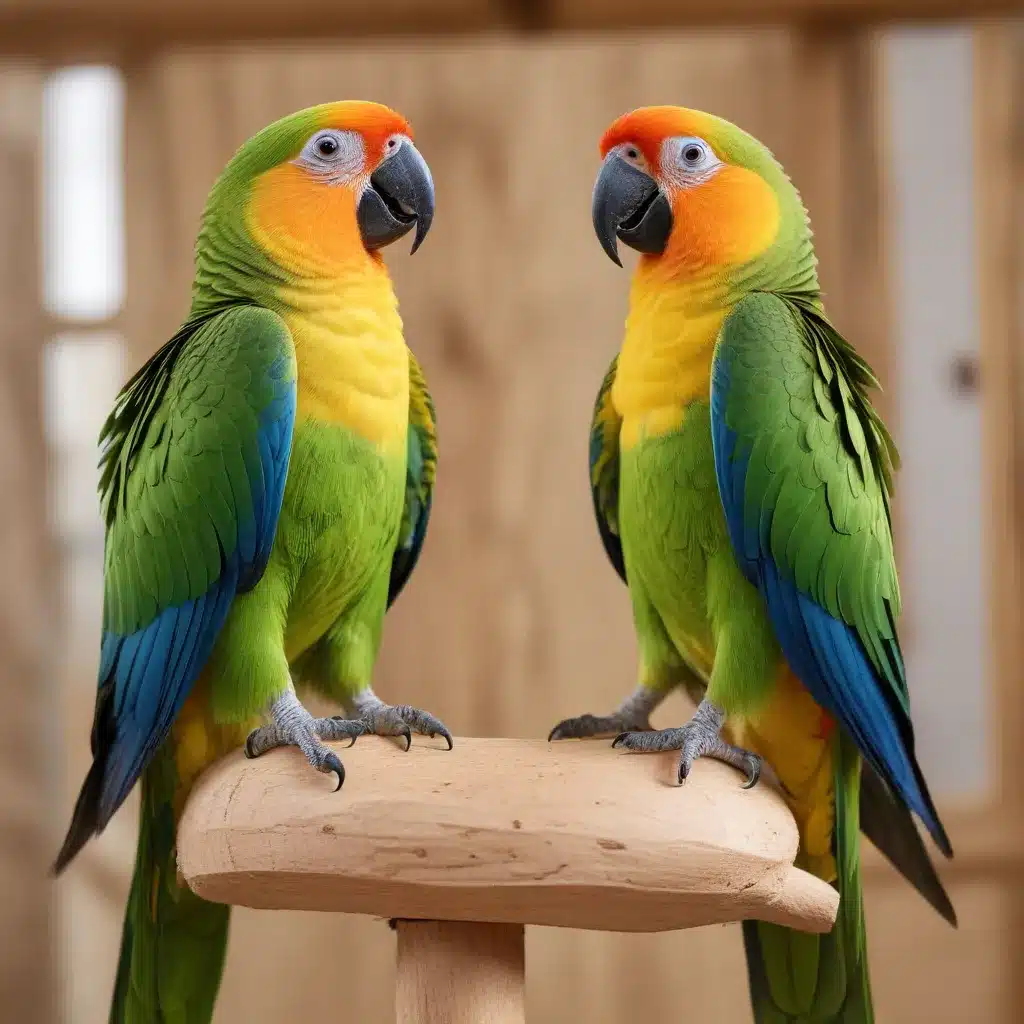
Parrot Behavior and Socialization
Parrot Personality Traits
Parrots are renowned for their remarkable intelligence and captivating personalities. These vibrant feathered companions possess cognitive abilities that rival those of young children, allowing them to learn tricks, mimic speech, and solve complex problems. But beyond their remarkable mental prowess, parrots are also inherently social creatures, with an innate need for companionship and interactive engagement.
In the wild, parrots thrive in dynamic flock environments, constantly communicating, playing, and bonding with their fellow birds. This social structure is not just a preference, but a fundamental aspect of a parrot’s psychological well-being. Their intelligence and emotional depth mean that parrots can develop strong emotional attachments, and without adequate social interaction, they may experience loneliness, stress, and even depression.
Parrot Social Needs
Parrots view their human caretakers as part of their flock, and they have an innate desire to engage with their “flockmates” through various social activities. Regular interaction, playtime, and shared experiences are crucial for a parrot’s overall health and happiness. When parrots are deprived of this social fulfillment, they may begin to exhibit concerning behaviors, such as excessive screaming, feather plucking, or even aggression.
The level of social interaction required varies across different parrot species, but the underlying need remains consistent. Even the smaller, more independent parrots, like budgies or cockatiels, thrive when provided with opportunities to engage in social activities and form meaningful connections with their human companions.
Parrot Playdates and Social Activities
Organizing Parrot Playdates
One of the best ways to fulfill a parrot’s social needs is by arranging playdates with other compatible parrots. When selecting potential playmates, it’s essential to consider factors like size, species, age, and temperament to ensure a harmonious and safe interaction. Introducing birds that are too dissimilar or have incompatible personalities can lead to stress, conflict, and even injury.
To prepare for a successful playdate, ensure that the environment is secure, comfortable, and free of potential hazards. Provide a spacious, well-ventilated area with plenty of perches, toys, and enrichment items to encourage natural behaviors and minimize the risk of territorial disputes. It’s also important to supervise the interactions closely and be ready to intervene if necessary.
Engaging Parrots in Social Activities
In addition to arranging playdates, there are numerous ways to engage your parrot in stimulating social activities. Interactive toys, such as puzzle feeders and foraging puzzles, can encourage problem-solving skills and promote cooperative behaviors. Group foraging exercises, where multiple parrots work together to access hidden treats, can be particularly rewarding.
Regular training sessions, using positive reinforcement techniques, can also serve as valuable social experiences. Not only do these sessions challenge your parrot’s cognitive abilities, but they also strengthen the bond between you and your feathered companion. Incorporating clicker training or target training into your routine can make these interactions even more engaging and rewarding.
Parrot Communication and Body Language
Interpreting Parrot Vocalizations
Parrots are renowned for their impressive vocal abilities, and understanding their vocalizations is crucial for fostering effective communication and positive interactions. From friendly chirps and whistles to aggressive squawks and screams, each parrot call conveys a specific message or emotional state.
By familiarizing yourself with the nuances of parrot vocalizations, you can better respond to your feathered friend’s needs and adjust your interactions accordingly. For instance, a high-pitched, excited chatter may indicate a desire to play, while a low, guttural growl could signal discomfort or impending aggression.
Observing Parrot Body Language
Alongside vocal cues, parrots also rely heavily on body language to communicate their feelings and intentions. Paying close attention to your parrot’s posture, feather positioning, and eye contact can provide valuable insights into their emotional state and help you navigate interactions more effectively.
A relaxed, upright posture with smooth, sleek feathers often indicates a content, comfortable parrot, while a hunched, fluffed-up appearance may signal stress or discomfort. Aggressive behaviors, such as a lowered head, flared feathers, and dilated pupils, should be recognized and respected to avoid potential conflicts.
Benefits of Parrot Socialization
Improved Psychological Well-being
Providing ample opportunities for social interaction and engagement can have a profound impact on a parrot’s overall psychological well-being. Regular playdates and interactive activities help alleviate boredom, reduce stress and anxiety, and promote cognitive stimulation – all of which are essential for a parrot’s long-term emotional health.
When parrots are able to engage in natural social behaviors and form meaningful connections, they often display increased confidence, curiosity, and a generally more positive demeanor. This enhanced psychological state can, in turn, lead to reduced instances of problematic behaviors, such as feather plucking or excessive vocalization.
Strengthened Human-Parrot Bonds
Fostering a parrot’s social needs not only benefits the bird’s well-being but can also deepen the bond between the parrot and their human caregiver. By actively participating in playdates, training sessions, and other interactive experiences, you demonstrate your commitment to your parrot’s happiness and reinforce the trust and understanding that form the foundation of a healthy human-parrot relationship.
As you learn to interpret your parrot’s vocalizations and body language, you’ll gain a better understanding of their unique personality and preferences. This enhanced communication can lead to more meaningful, responsive interactions, allowing you to tailor your approach and create a more enriching environment for your feathered companion.
At Mika Birds Farm, we believe that encouraging social interaction and fostering strong human-parrot bonds are essential for the long-term well-being of our avian friends. By providing our parrot residents with ample opportunities for playdates, interactive enrichment, and positive reinforcement training, we strive to cultivate a nurturing and stimulating environment that supports their physical, mental, and emotional needs.
Whether you’re a seasoned parrot enthusiast or a first-time bird owner, prioritizing your parrot’s social well-being can unlock a world of rewarding experiences and deepen the cherished bond you share. With patience, dedication, and a keen understanding of parrot behavior and communication, you can create a thriving, enriched life for your intelligent, social parrot companion.


